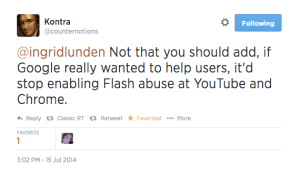Google is on track for mobile search queries to overtake those on desktop this year, and today it took one more step forward in how it is will control that experience on behalf of its users — for better or for worse. The company has announced that it will now flag to its users when websites listed in their search results may have elements that will not show up on a users’ device. That unsupported code today typically results in missing elements and blank screens.
To be clear, Google does not say that it will leave out those sites altogether in its search results, or bar you in any way from visiting them. But I suspect a lot of sites that are written with un-supportable code (even in part) will see a drop in their traffic as a result of those warnings.
Here’s how it will look. If you are using an iOS device or one running a later version of Android (4.1 or higher) the results will look a little something like this if you get a Flash-based site:

That will effectively pre-empt you from seeing screens like this one when you view an unsupported site on your device:

This is an interesting development for Google in light of a couple of other things.
The first is on the aesthetic side.
During its I/O developer event in June, the company made a big push on presenting its design language and ethos, embodied most succinctly in its “Material Design” guide but also permeating through other product launches before, during and after the event.
Google is not trying to be Apple per se, but it’s pushing hard at presenting a more unified and controlled ecosystem and experience. Better experience is where this kind of more tailored, user-specific web searching fits in perfectly.
It also fits with other changes that Google has made to the mobile search experience. In June, for example, it also started to flag “faulty redirects” — indicating when search links might send you to a “smartphone optimized” home page instead of to the page you wanted.
Again, these indications in search results can be viewed in very opposing ways. Some may be happy that Google is cutting down wasted clicking time. But some will be put off by how Google wants to steer you.
And some believe it’s only a partial advance in a bigger issue:

In keeping with the stronger and more unified experience, Google is also using the announcement to plug more use of HMTL5, which is universally supported on all devices, responsive design, and also two of its own, new website building tools: Web Fundamentals: “a curated source for modern best practices”; and Web Starter Kit: “a starter framework supporting the Web Fundamentals best practices out of the box.”
This is also a moment that Google uses to make sure developers are not trying to opt out of Google’s search algorithms, too.
“Be sure not to block crawling of any Googlebot of the page assets (CSS, JavaScript, and images) using robots.txt or otherwise,” write Keita Oda, Software Engineer, and Pierre Far, Webmaster Trends Analyst at Google UK, in the blog post.
“Being able to access these external files fully helps our algorithms detect your site’s responsive web design configuration and treat it appropriately. You can use the Fetch and render as Google feature in Webmaster Tools to test how our indexing algorithms see your site.”
The second is more directly in Google’s main line of business, search.
Just last week, we published a leaked document from Yelp highlighting claims that Google was altering the way that search results were being presented, with a shift to Google-focused content over that of its competitors.
That’s a long-standing argument, of course, but in mobile the competitive presence seems to be more acute. A recently published study found that the biggest rival to browser-based search (Google) is the rise of specific apps (such as Yelp’s). Making the browser experience more effective and less full of junk could be one way Google may be able to hold on to its audience there.
H/T @adders
